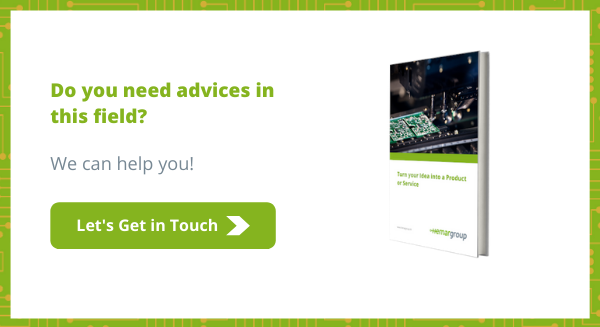
Running a Tech Startup in 2018 is not as easy as it seems, we knows here at Hemargroup: even with a great pitch of for your idea, you still need to rush around to convince investors, boost your digital marketing-efforts in order to improve brand awareness, and the list goes on. And the most important thing? Constantly improving a market-fit product that can help you achieve scalability as quick as possible.
In a fast-paced world, where nearly $6 trillion will be spent on IoT solutions over the next five years and it is predicted to lead to 1 trillion of connected devices by the end of 2025, (HP Report on Internet of Things, 2015), there’s full-scale potential for your Tech startup to integrate IoT into your product offering.
While the strategy, criteria, and business model may vary from device to device and from industry to industry, your Tech Startup can take advantage of this rising trend in many ways: from creating a first IoT device prototype to using the IoT in your production-process, here’s why your Tech Startup should take advantage of it today.
What exactly is IoT?
To come get to the point, the Internet of Things relates to the concept of connecting any device to other devices thanks to the Internet: by collecting a great amount of data, an IoT device can easily give you the overview on what is happening in the environment around the device itself.
As An easy way to see it is to think of Internet of Things as “a giant network of connected things and people – all of which collect and share data about the way they are used and about the environment around them” (IBM).
An example of IoT? You may already know wearable Iot fitness devices that, by measuring the core KPIs of your heart and body, can suggest custom fitness plans or smart home devices, from smart door locks to apps connected to the electric system of your electrical system at home.
When IoT meets Startups
You don’t necessarily need to create a whole new, disruptive product to make an IoT device: you can also work with the product you’re already developing by integrating an Internet of Things technology or mindset in the process: think of increasing the level of connectivity among different elements of your products or offering: the aim is to help solve a problem by finding the most streamlined solution that will lead your startup to the scalability you are really looking for.
Your startup can implement IoT in many different ways: “The reality is that IoT allows for virtually endless opportunities and connections to take places, many of which we can’t even think of or understand the impact of today,” says Jacob Morgan in A Simple Explanation of ‘The Internet of Things”. And it comes with no doubt that “[Internet of Things] certainly opens the door to a lot of opportunities, but also many challenges”, as RocketSpace reports on IoT and Startups.
There are many ways your startup can start getting closer to the IoT rising market: stay updated with the latest news on online magazines such as TechCrunch or Tech.co, follow the main IoT experts or even participate to in the most important IoT trade shows on the topic such as:
- Mobile World Congress (Barcelona)
- Embedded World (Nuremberg)
- Global IoT summit (Bilbao & Geneve)
As the buzz around this topic is rising, it comes with no surprise to see more and more articles talking about the most innovative IoT companies and products you need to know: from smart homes solutions to a medical emergency bracelet, to data securitization and management, the IoT startups are on the rise.
If you’re looking for examples and best practice, you can always keep an eye on the hottest startups in the context of IoT context to get some inspiration, such as Business Insider’s top IoT companies to watch and stocks to invest in.
Game players in the IoT-ecosystem
In our latest article about IoT Emerging trends for 2018, we’ve seen how companies from different industries are increasingly involved into the Internet of Things and how Governments are also buzzing around it too.
In fact, according to Business Insiders (2016), not only will governments will be on top of the trend, with smart cities and other projects: the top adopters of IoT will be businesses, both consumer and industrial companies. They’ll be able to improve their bottom line in many different a variety of ways, from lowering operating costs to developing new product offerings, to increasing productivity to and expanding to new markets.
What Business Model should your IoT startup consider?
One of the most difficult parts of taking your tech startup to the market is setting the right pricing to let scalability match with the right revenue stream: the same will happen in case if you integrate your offer with an IoT device. Emanuele Angelidis, is CEO of IoT incubator program, (Breed Reply), covers on his some of the possible business models an IoT startup can rely on in his TechCrunch article, such as:
- Product cost plus one-off premium service, which is the business model your startup would consider in case you can offer add-on services like apps together with your IoT product.
- Product cost plus recurring premium revenue, with which you’ll ask your customer for an entry fee and then a monthly-based subscription plan.
- Free product with an ongoing revenue stream. This business model is the one used by Sky TV, where the service is linked to an hardware, that which will be the first step to guaranteeing a long-term customer relationship.
“In all of these revenue models, the key is identifying long-term relationships the keenest of users may want to have with your product. But makers must be sensitive to the value retail consumers expect a product to promise out of the box. Setting the subscription needle too soon risks disappointing customers; but striking the right balance of perceived and potential value sets the tone for a win-win future in IoT.” concludes Angelidis.
With the right mindset, a reliable source of information and business model will definitely help your tech startup take advantage of the IoT-ecosystem to get to obtain the visibility, marketability, and scalability you are looking for in order to achieve.
.png)
